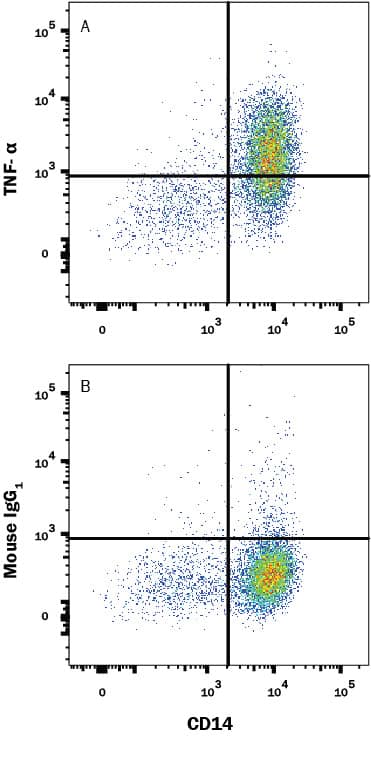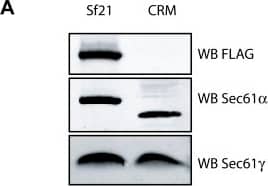Human TNF-alpha Antibody
R&D Systems, part of Bio-Techne | Catalog # MAB2101


Conjugate
Catalog #
Key Product Details
Validated by
Biological Validation
Species Reactivity
Validated:
Human
Cited:
Human, N/A
Applications
Validated:
CyTOF-ready, Flow Cytometry, Neutralization
Cited:
ELISA Capture, Flow Cytometry, Neutralization
Label
Unconjugated
Antibody Source
Monoclonal Mouse IgG1 Clone # 6401
Product Specifications
Immunogen
E. coli-derived recombinant human TNF-alpha
Gly57-Leu233 (predicted)
Accession # P01375
Gly57-Leu233 (predicted)
Accession # P01375
Specificity
Detects human TNF-alpha in direct ELISAs and Western blots. In direct ELISAs, approximately 25‑50% cross‑reactivity with recombinant porcine TNF‑ alpha and recombinant rhesus macaque TNF-alpha is observed but no cross-reactivity with recombinant cotton rat TNF‑ alpha, recombinant rat TNF‑ alpha, recombinant human (rh) LT alpha1/ beta2, rhLT alpha2/ beta1, rhAPRIL, rhBAFF, rhEDA‑A2, recombinant mouse EDA, rhFas Ligand, rhLIGHT, rhOX40 Ligand, rhTRAIL, rhTRANCE, rhTWEAK, or rhVEGI is observed.
Clonality
Monoclonal
Host
Mouse
Isotype
IgG1
Endotoxin Level
<0.10 EU per 1 μg of the antibody by the LAL method.
Scientific Data Images for Human TNF-alpha Antibody
Cytotoxicity Induced by TNF-alpha and Neutralization by Human TNF-alpha Antibody.
Recombinant Human TNF-a (Catalog # 210-TA) induces cytotoxicity in the L-929 mouse fibroblast cell line in a dose-dependent manner (orange line). Cytotoxicity elicited by Recombinant Human TNF-a (0.25 ng/mL) is neutralized (green line) by increasing concentrations of Human TNF-a Monoclonal Antibody (Catalog # MAB2101). The ND50 is typically 0.015-0.06 µg/mL in the presence of the metabolic inhibitor actinomycin D (1 µg/mL).Detection of TNF‑ alpha in Human PBMC Monocytes by Flow Cytometry.
Human PBMCs were treated with 1μg/ml LPS for 4 hours then stained with (A) Mouse Anti-Human TNF-a Membrane Form Monoclonal Antibody (Catalog # MAB2101) or (B) isotype control antibody (MAB002) followed by anti-Mouse IgG PE-conjugated Secondary Antibody (F0102B) and Mouse anti-Human CD14 APC-conjugated Monoclonal Antibody (FAB3832A). Staining was perfomed using our Staining Membrane-associated Proteins protocol.Detection of Insect TNF-alpha by Western Blot
The pre-integrated TMD docks to the cytosolic tip of the lateral gate.(A) Co-immunoprecipitation of recombinant FLAG-Sec61 alpha and Sec61 gamma. Sf21 insect cell microsomes were solubilized with 1% Deoxy BigChap (DBC) and subjected to anti-FLAG immunoprecipitation (IP). Eluted samples (Sf21) were analyzed by immunoblotting next to a sample of canine microsomal ER membranes (CRM). (B) Comparison of the relative CT7 photo-crosslinking efficiency of canine rough microsomes (CRM) and Sf21 microsomes containing wild-type FLAG-Sec61 alpha/ gamma complex. CT7 crosslinking was performed as before. The relative crosslinking efficiency of recombinant Sec61 alpha was normalized to the native protein. (C) BMH crosslinking reactions using recombinant FLAG-Sec61 alpha/ gamma complex. Cys49 TNF alpha 126-mers were prepared in the presence of Sf21 microsomes, and BMH crosslinking reactions were conducted as described previously. Reactions were either analyzed directly (Total) or after denaturing IP with anti-FLAG affinity resin. IP with the anti-HA affinity resin served as a specificity control. (D) Western blots of Sf21 microsomes co-expressing either wild-type or mutant FLAG-Sec61 alpha/ gamma. Insect cell microsomes from cells infected with a baculovirus that lacked Sec61 genes (control virus) served as a control. (E) CT7 crosslinking of mutant Sec61 alpha/ gamma complexes containing the indicated cysteine substitutions. The region of the gel corresponding to FLAG-Sec61 alpha is shown. Detection of photo-affinity labeling that is competed by CT9 indicates that the mutant Sec61 alpha/ gamma complex is properly folded.DOI:https://dx.doi.org/10.7554/eLife.01483.010 Image collected and cropped by CiteAb from the following publication (https://elifesciences.org/articles/01483), licensed under a CC-BY license. Not internally tested by R&D Systems.Applications for Human TNF-alpha Antibody
Application
Recommended Usage
CyTOF-ready
Ready to be labeled using established conjugation methods. No BSA or other carrier proteins that could interfere with conjugation.
Flow Cytometry
0.25 µg/106 cells
Sample: Human PBMC treated with 1 μg/ml LPS for 4 hours
Sample: Human PBMC treated with 1 μg/ml LPS for 4 hours
Neutralization
Measured by its ability to neutralize TNF‑ alpha-induced cytotoxicity in the L‑929 mouse fibroblast cell line. Matthews, N. and M.L. Neale (1987) in Lymphokines and Interferons, A Practical Approach. Clemens, M.J. et al. (eds): IRL Press. 221. The Neutralization Dose (ND50) is typically 0.015-0.06 µg/mL in the presence of 0.25 ng/mL Recombinant Human TNF‑ alpha and 1 µg/mL actinomycin D.
Formulation, Preparation, and Storage
Purification
Protein A or G purified from ascites
Reconstitution
Reconstitute at 0.5 mg/mL in sterile PBS. For liquid material, refer to CoA for concentration.
Formulation
Lyophilized from a 0.2 μm filtered solution in PBS with Trehalose. *Small pack size (SP) is supplied either lyophilized or as a 0.2 µm filtered solution in PBS.
Shipping
Lyophilized product is shipped at ambient temperature. Liquid small pack size (-SP) is shipped with polar packs. Upon receipt, store immediately at the temperature recommended below.
Stability & Storage
Use a manual defrost freezer and avoid repeated freeze-thaw cycles.
- 12 months from date of receipt, -20 to -70 °C as supplied.
- 1 month, 2 to 8 °C under sterile conditions after reconstitution.
- 6 months, -20 to -70 °C under sterile conditions after reconstitution.
Background: TNF-alpha
Long Name
Tumor Necrosis Factor alpha
Alternate Names
Cachetin, DIF, TNF, TNF-A, TNFA, TNFalpha, TNFG1F, TNFSF1A, TNFSF2
Entrez Gene IDs
Gene Symbol
TNF
UniProt
Additional TNF-alpha Products
Product Documents for Human TNF-alpha Antibody
Product Specific Notices for Human TNF-alpha Antibody
For research use only
